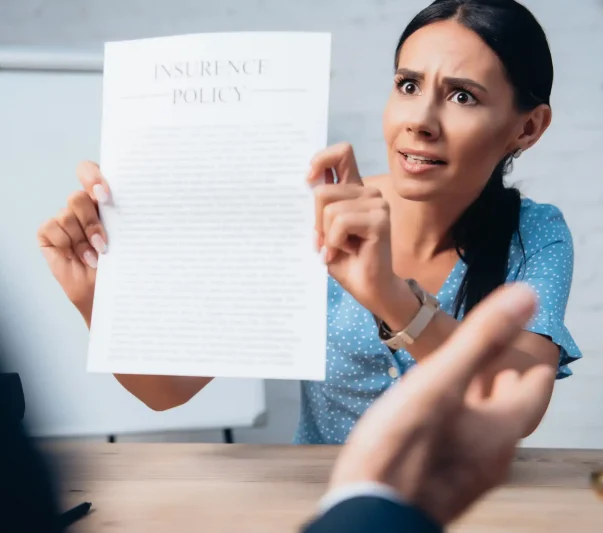If you’re injured in an accident that wasn’t your fault, your case will most likely end with an insurance settlement rather than a verdict. That means your primary opponent isn’t really the person who caused the accident. Instead, it’s their insurance company. And because insurance companies are driven by profits instead of doing what’s right for accident victims, they will try to get away with paying as little as possible in a settlement.
Before you accept any insurance settlement after an accident, talk to an experienced personal injury lawyer. Attorney Sean Olson of Olson Personal Injury Lawyers, has spent more than a decade helping accident victims seek fair compensation for their injuries. Our firm can evaluate your offer and, if it’s too low, help you demand more money for your losses to ensure you get justice for your injuries. Contact us today for your free initial consultation.
What Is Considered a Good Settlement Offer?
Many people accept less money than they should in an insurance settlement because they don’t know what a good offer is, and don’t know that they can negotiate with the insurance companies. While “good” is a subjective term, you’re generally looking for a settlement that adequately covers your present and potential future medical expenses, lost wages, and any other financial losses related to the accident. On top of that, you can seek compensation for the pain and emotional distress the accident caused.
The particular amount that qualifies as a reasonable offer will depend on the extent of your injuries and other factors, and that can be hard to calculate on your own. Talking to a lawyer can help you get a better picture before agreeing to a settlement.
What If My Insurance Settlement Is Too Low?
When you accept an insurance settlement, you agree not to pursue additional compensation from whoever caused the accident. So, if you take a settlement offer that’s too low, you most likely won’t be able to get any more money if you need it.
That could mean you may not have the resources to pay your future medical bills, cover your lost wages, and pay for any additional care you may need. Before you accept any insurance settlement, speak to a lawyer to see if you’re getting a fair deal. If the offer is insufficient, you can reject the insurance offer, and your attorney can build a persuasive case and pursue full coverage of your losses.
What Happens If I Don’t Accept My Settlement Offer?
A few different things could happen if you don’t accept an insurance company’s settlement offer. If it’s their first offer, you can make a counteroffer and see how they respond. Depending on your offer and how strong your case is, the insurance company could come back with a more reasonable settlement, and you can wrap up your claim.
If you’ve already engaged in prolonged settlement negotiations and the insurance company won’t budge on their offer, you may have to take your case to court if you want additional compensation.
However, going to court is risky, as you could come away with nothing. Depending on the strength of your case, it could be worth the risk, but you’ll want help from an experienced personal injury attorney. Our attorneys don’t require any upfront costs to take your case, and you will only pay once we settle your claim.
How Should I Respond to a Low Settlement Offer?
If you get an unfairly low settlement offer, that does not mean your case is over, or you have no options. Instead, after receiving the offer, talk to a lawyer and take the following steps:
- Try to remain calm and examine the offer. After receiving a low settlement offer, the most important thing to do is to stay calm. Blowing up at the insurance company won’t do you any good, and it may actually hurt your case. As angry or upset as you may feel, do your best to keep cool and break down the offer. Some aspects of the offer may be fair, while others are unreasonable. If you can tell the insurance company what is and is not reasonable about their offer, you’ll have a strong position as negotiations begin again.
- Provide a formal, written response. It’s essential to respond in writing, not verbally, if you receive a low settlement offer. First off, writing is more precise and gives you the chance to make sure you don’t say anything that could accidentally harm your case. Second, responding in writing allows you to provide additional evidence to support your claim.
- Formulate your counteroffer. You may not get everything you want in an insurance settlement, but making a counteroffer can help you get more of what you want. Your counteroffer can give the insurance company a better picture of the amount you’re willing to accept in a settlement, making negotiations more straightforward. Our team has drafted a sample rejection letter for a low settlement offer, you can use if you are unsure of where to start.
- Settle after you’ve recovered. Do not accept any settlement until you’ve recovered from your injuries or reached maximum medical improvement and know your future medical costs. Once you take a settlement, you can’t negotiate for any additional compensation, so you need a complete picture of what your treatment will actually cost before you agree to a settlement.
Always respond to a low settlement offer in writing rather than over the phone or in person. Submitting a counteroffer in writing gives you a chance to provide more evidence to support your claim. If you haven’t already hired a lawyer, do so before you respond to the low offer you received.
Should I File a Personal Injury Lawsuit?
Sometimes the threat of a lawsuit is enough to bring insurance companies back to the table, as they know trials are risky. In other cases, though, insurance companies will dig in their heels and take their chances in court. However, it is well-known that most cases settle before going to trial. If your case does go to trial, you need to get help from an experienced trial lawyer, so they can focus on building a strong case for you.
How a Personal Injury Lawyer Can Help You Negotiate a Settlement
Hiring a personal lawyer gives you the best chance of getting a fair insurance settlement. Your attorney can help you document your other losses, file your claim, and handle all the correspondence with the insurance companies while you rest and heal. If your case goes to trial, your personal injury lawyer can help you prepare, so you have the best possible chance of getting the money you need.
The attorneys at Olson Personal Injury Lawyers are trial lawyers first, meaning we are ready to fight for your rights until the end. If you are unsure of your legal options, contact us today for your free, no-obligation consultation.
A serious injury can impact your health, work, and future. We’re here to hold the responsible party accountable and get you the compensation you deserve.







